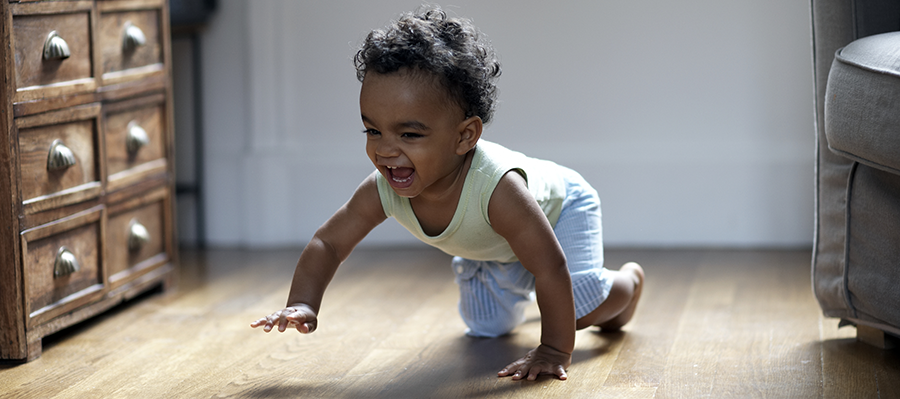
Babies develop on different schedules
Babies grow up on their own timeline. Every child is different, so if your baby is slower to reach some of these milestones — or faster — don't worry! Here are some important ones to keep an eye out for.
Newborn
Physical
Your baby needs time to get strong. As a newborn, he can move both sides of his body, and he might lift and turn his head when lying on his tummy. He can see you when you're about 12 inches from his eyes.
Mental/Language
Your baby can't speak, but he can communicate. Crying is his language. Soon you may be able to tell what he's asking for based on the sound of his cry.
Social/Emotional
It might seem like your baby is in her own little world, but she's also tuned into yours. She responds to faces, wakes up when she hears voices, and begins to recognize you.
1 Month
Physical
Every day, your baby gets stronger. She can lift her head when placed on her tummy, and she can follow an object or a face with her eyes.
Mental/Language
Your baby might cry more now than she did at first. She knows her cries are working when you respond by meeting her needs. But you probably hear other sounds now, too, such as short sounds like "uh" and "eh." Your baby also may look alert when she hears noises, like the rattle of a toy or the doorbell.
Social/Emotional
By now your baby knows your voice. She also may make eye contact with you.
2 Months
Physical
One month ago, your baby would follow an object only with his eyes, and now he begins to turn his head to keep looking. When you place him on his tummy, he's strong enough to lift his head and upper chest. He might hold onto a toy if you put it in his hand.
Mental/Language
Your baby is starting to try making other noises. You're likely to hear his first coos now. He might "speak" when you speak!
Social/Emotional
At 2 months, your baby is ready to reward you with a smile!
4 Months
Physical
Your baby can hold onto things now and her grip is getting stronger. When lying on her tummy, she can lift her head high enough to take a good look around. She might be able to roll over from front to back. She might roll over the other way soon, too. When you hold your baby up, she seems to support her own weight and may even bounce up and down.
Mental/Language
Seeing your baby's smile was pretty special, and now you're in for more treats — laughs and squeals.
Social/Emotional
Your baby perks up when she sees her teddy bear or when a family member walks into the room. She's recognizing objects and faces now. She's also trying to talk. She seems to listen when you speak, wait for you to stop, and then respond with her own sounds. Keep up your end of the chat. Your baby wants to hear your voice and has a lot to say in return.
6 Months
Physical
Your baby is much stronger now. He rolls over both ways and pushes himself up to look around. He begins to sit alone, sometimes with his arms out in front for support. His little hands can reach for objects and bring them right to his mouth. He'll also move objects from hand to hand.
Mental/Language
Now the babbling begins! Your baby starts to practice different noises to tell you what mood he's in and what he wants. And if he's figured out how to make stick his tongue out and make a fizzy blowing sound, he’ll probably love hearing you do it, too.
Social/Emotional
The laughs keep coming, and your little one now shows more emotions. He's attached to you and knows the difference between loved ones and strangers. He might even be the first to ask you to play with him.
9 Months
Physical
At 9 months, your baby might start to crawl. Some babies never crawl, but go straight from sitting to walking. She'll also start pulling herself up on the furniture. She can pick up small things and she wants to feed herself with her fingers as much as possible. Banging objects is a favorite hobby now. Your baby bangs two things together or bangs one on the table. Your baby uses a finger to poke at things.
Mental/Language
She makes lots of noises and may wave bye-bye to you. She may not be ready to speak, but she'll know her name. If you hide a toy under a cloth, your baby will know the toy is still there and uncover it herself.
Social/Emotional
Your baby has been attached to you for some time. But now she might cry or turn away from people she doesn't know. This is perfectly normal. Your baby might be up for peekaboo or Pat-a-Cake now.
Remember, not all babies follow this timeline. Ask your baby’s doctor any questions you may have.